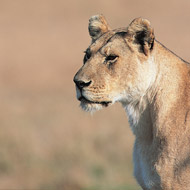Herdsmen charged for lion poisonings

The Born Free Foundation said it was "devastated" by the deaths and raised concerns about the impact this could have on the rest of the pride (stock photo).
Two Maasai herdsmen have been charged with poisoning a famous pride of lions in Narok, south-west Kenya.
So far, two lionesses from the Marsh pride have been found dead. The first was identified as Bibi, one of the oldest and most famous members of the pride.
A second lion carcass was mauled beyond recognition by hyenas, but it is assumed to be Sienna, another member of the pride that has not been seen since the incident.
The Marsh pride featured in the popular BBC series 'Big Cat Diary', which aired from 1996-2008.
According to the David Sheldrick Wildlife Trust (DSWT), an autopsy carried out on Bibi on 7 December found traces of carbofurans. This confirmed the insecticide marketed as Furadan had been used to poison Bibi.
Eight vultures have also died as a result of preying on the poisoned remains of the dead lionesses. The lion carcasses have been incinerated and their remains buried to prevent any further fatalities.
Meanwhile, a lion cub known as Alan has been euthanised. While he was recovering from suspected poisoning, he was attacked by a buffalo resulting in serious internal injuries.
All other members of the pride have been located and are no longer showing any signs of poisoning, according to the Kenya Wildlife Service (KWS).
Suspected poisoning was first reported on Sunday, 6 December by the Governor's Camp in the Maasai Mara. A KWS veterinary officer confirmed that up to five lions had ingested a poison of some description.
Two herdsmen have been charged in Narok Court with poisoning the Marsh pride, according to DSWT.
The Born Free Foundation said it was "devastated" by the deaths and raised concerns about the impact this could have on the rest of the pride.
CEO Adam Roberts said: "Lions are the most social of all the big cats. They rely on the stability of their prides in order to survive. The loss of even a few lions in this way will seriously damage the pride's ability to function."



 The Veterinary Medicines Directorate (VMD) is inviting applications from veterinary students to attend a one-week extramural studies (EMS) placement in July 2026.
The Veterinary Medicines Directorate (VMD) is inviting applications from veterinary students to attend a one-week extramural studies (EMS) placement in July 2026.